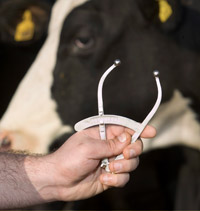Welsh TB testing reveals higher incidence of disease

Bovine tuberculosis testing in Wales has revealed a high incidence of reactors in an area thought to be relatively free of the disease.
The discovery is the result of Wales’ radical policy of TB testing the entire national cattle herd.
Over a 15-month period, 11,761 herds, including 4000 in areas with few recorded cases of bovine TB, were tested. The TB Health Check Wales testing programme uncovered 103 new cases. More than half of these were in north Wales in areas previously believed to be low risk.
Reports published this week detailing the results of this initiative conclude that it has created a better appreciation of the geographical clustering of infection.
Other main findings include:
• Action needs to be taken in the short to medium term to protect areas with lower levels of disease with a tougher response to outbreaks in these area and their sources, either cattle or wildlife.
• Movement of cattle is an important route of disease transmission.
Under TB Health Check Wales every cattle herd in the country is subject to an annual TB test and farmers are required to test cattle before moving them off farms.
The reports resulting from its initial operation are said to provide the most accurate and up-to-date picture of the spread of bovine TB in Wales. And this has led to important policy changes.
Chief veterinary officer, Christianne Glossop, admitted the policy had a greater impact on animal health, farmers and vets in north Wales, where most of the additional tests had taken place.
“By identifying disease in areas of low incidence, it showed that we need to be vigilant and not allow TB to spread even further,” said Professor Glossop. “It has also highlighted the importance of a regional approach to support all Welsh policies, a task taken forward with enthusiasm by the North Wales TB Eradication Board.”
She described TB Health Check Wales as an important foundation stone to the programme of eradication.
It has resulted in better procedures for dealing with cattle owners unwilling to co-operate with the testing regime and a speedier removal of reactors from farms. “It is clear that cattle play an important role in the transmission of bovine TB, and this exercise has provided us with valuable evidence for the future management of bovine TB,” said Professor Glossop.
